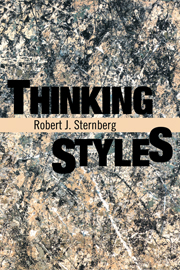
-
Select format
-
- Publisher:
- Cambridge University Press
- Publication date:
- 05 August 2012
- 13 August 1997
- ISBN:
- 9780511584152
- 9780521553162
- 9780521657136
- Dimensions:
- (216 x 138 mm)
- Weight & Pages:
- 0.49kg, 196 Pages
- Dimensions:
- (228 x 152 mm)
- Weight & Pages:
- 0.31kg, 196 Pages
- Subjects:
- Psychology, Cognition, Educational Psychology
You may already have access via personal or institutional login- Subjects:
- Psychology, Cognition, Educational Psychology
Book description
In our society, the recognition of talent depends largely on idealized and entrenched perceptions of academic achievement and job performance. Thinking Styles bucks this trend by emphasizing the method of our thought rather than its content. Psychologist Robert Sternberg argues that ability often goes unappreciated and uncultivated not because of lack of talent, but because of conflicting styles of thinking and learning. Using a variety of examples that range from scientific studies to personal anecdotes, Sternberg presents a theory of thinking styles that aims to explain why aptitude tests, school grades, and classroom performance often fail to identify real ability. He believes that criteria for intelligence in both school and the workplace are unfortunately based on the ability to conform rather than learn. He takes the theory a step further by stating that 'achievement' can be a result of the compatibility of personal and institutional thinking styles, and 'failure' is too often the result of a conflict of thinking styles, rather than a lack of intelligence or aptitude. Sternberg bases his theory on hard scientific data, yet presents a work that remains highly accessible.
Reviews
"Sternberg is a prolific and insightful writer. The ideas contained in this book may be useful to educators, employers, and psychologists. The information provided may help those in a position to make decisions about the value of others' contributions more aware of stylistic differences that may have a great deal of impact on performance, but have very little to do with ability...[and] may help sensitize people to recognize the value of differences in mental self-government to help capitalize on those differences." Contemporary Psychology
"[Sternberg's] examples are vivid and practical...Sternberg manages a clear, relatively jargon-free style and has organized his material in a user-friendly way." The Providence Sunday Journal
"[Sternberg's] ideas are provocative...They help explain why some of the very brightest kids flourish only after they've left their days of drab schooling far behind." Teacher Magazine
"A very readable book, which should interest a wide audience including upper-division undergraduates in education, psychology, and sociology." G.C. Gamst, Choice
"This is a thoughtfully constructed book that undertakes a fresh look at cognitive styles....The book is enjoyable and essential for all students, educators, employers, researchers and others interested in cognition and intelligence." Roseanne L. Flores, Readings
"In this stimulating and thought-provoking book, one of today's best-known psychologists provides a fascinating discussion of the many different ways people think and work today." Library and Information Science Annual
Contents
Metrics
Altmetric attention score
Full text views
Full text views help Loading metrics...
Loading metrics...
* Views captured on Cambridge Core between #date#. This data will be updated every 24 hours.
Usage data cannot currently be displayed.
Accessibility standard: Unknown
Why this information is here
This section outlines the accessibility features of this content - including support for screen readers, full keyboard navigation and high-contrast display options. This may not be relevant for you.
Accessibility Information
Accessibility compliance for the PDF of this book is currently unknown and may be updated in the future.


